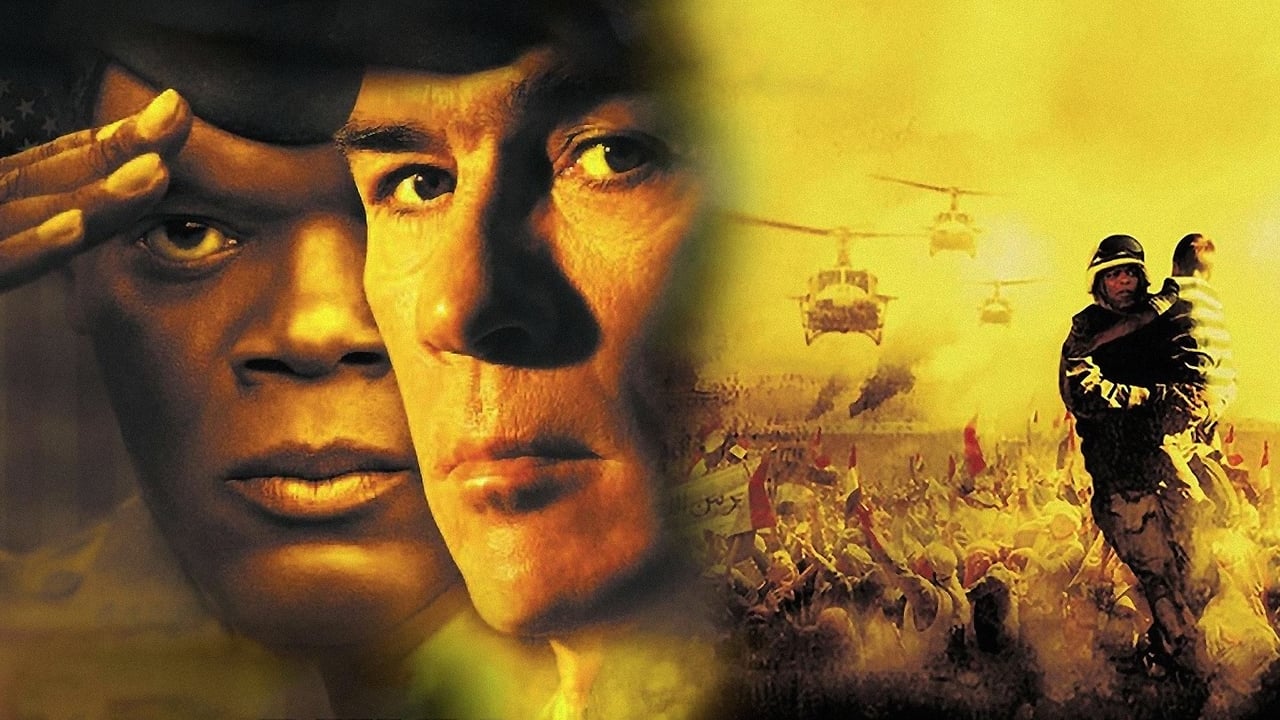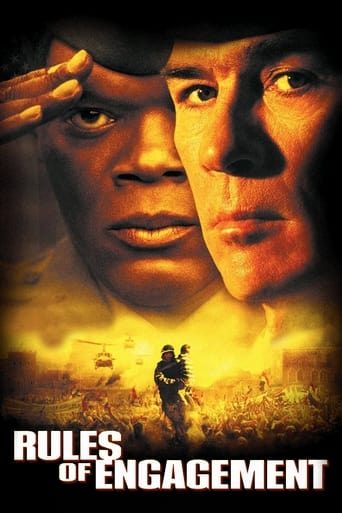

This movie is very entertaining and becomes more relevant as the years pass. A Marine is sent to retrieve an ambassador and his family from an embassy after a supposedly peaceful protest is supposedly hijacked by snipers. The marines evacuate the ambassador and then fire on the "peaceful" protesters after several marines are killed. Government officials then lie and destroy evidence to blame the Colonel in charge. This movie was made over a decade before Benghazi. Much of the drama takes place in the courtroom where the Colonel hires an old friend who he served with to defend him. The government attempts to throw the full weight of their corruption to throw the Colonel in prison. The Hollywood ending unfortunately does not correspond to what normally happens in real life.
... View MoreReleased in 2000, "Rules of Engagement" is about two Marine officers, Childers (Samuel L. Jackson) and Hodge (Tommy Lee Jones), who have a relationship going back to Vietnam. Childers is charged with murder after leading a team to the Yemen embassy to save the Ambassador and his family during a violent "demonstration" (more like an all-out attack) and calls on Hodge to defend him. To save face, the National Security Adviser (Bruce Greenwood) wants Childers to be the scapegoat at all costs, disregarding blatant evidence to the contrary. Can Hodge, an alcoholic and mediocre lawyer at best, save his buddy who once saved his life? Guy Pierce plays the prosecutor while Ben Kingsley & Anne Archer play the Ambassador and his wife.This is a war-drama by the maker of 1973's "The Exorcist" and 1977's "Sorcerer" similar in tone/plot to 1992's "A Few Good Men." I like "Rules" better, despite some flaws (like being contrived). It may not have an iconic line like "You can't handle the truth!" but it has quality combat action (which "A Few" didn't have) and the story of the protagonists is just more compelling IMHO. The movie's effectiveness hinges on Jackson and Jones convincing us of their characters, their relationship and their crisis, which they easily do. Some critics have decried the film as "racist" (naturally), but it's more like telling the awful truth with 2012's infamous Benghazigate scandal lending support. Director Friedkin said the movie's not anti-Arab, anti-Muslim and certainly not anti-Yemen, it's anti-terrorist. Bear in mind that the King of Morocco had to read and approve the script before the filmmakers could use Morocco for locations and nobody participating from the Arab side of things felt the film was anti-Arab.One critic complained about a peripheral character not resurfacing at the end, but why pan a story for NOT being predictable?The blurb at the end makes it seem like the movie was based on a true story, but it's not. It simply reveals what happens to the characters after the story ends so the viewers aren't left in the air.The movie runs 128 minutes and was shot in Morocco (substituting for Yemen), South Carolina (Vietnam), Virginia and Washington DC.GRADE: B+
... View MoreI would rate this movie a 0/10 if I could! "Rules of engagement" written by John Webb ( former secretary of the navy) is obviously a political movie that portrays Arabs of both gender and all ages as terrorists. This movie is simply an instrument used to demons and dehumanize Arabs, and anyone who applauds to this movie is either null of intellect or is a racist who enjoys watching movies that demonetizes Arabs!At the beginning of the movie, US marines are in the US embassy in Yemen which is surrounded by aggressive and barbaric protesters. Here we see Arabs portrayed as a mindless barbaric race as they are attacking the embassy. The US marines then rescue the diplomatic staff, and afterward they are entrenched on the roof while the protesters are raging beyond. However when the Colonel (Samuel. L. Jackson) orders the marines to wave down the US flag, 3 US marines get gunned down by snipers. After the Colonel has lost 3 of his men, he then orders his men to open fire on the crowd, but one of his men claims that there are women and children amongst the crowd, but this didn't give the Colonel any second thoughts, he then shouts "Waste those mother f****s!!'', and they eventually opened fire on the crowd causing the death of 83 civilians, including the innocent children and women. Here I was shocked. I didn't believe what I was watching. I was disgusted.After this horrific and bloody scene, investigations take place. The Colonel appoints his old friend Hodges (fought side by side with him in Vietnam) as his lawyer. Hodges then travels to Yemen in the hope of finding witnesses. Afterward, he was told there that the US marines have opened fired first. As he was roaming around, he finds a young Yemeni girl that has lost her leg due to the massacre, and follows her into a hospital. In the hospital he finds many children who are in the same bad condition as her. As he is leaving the hospital, he finds an audiotape on the floor which he have already seen many copies of the same tape in the streets of Yemen. During the trial, the audiotape gets translated it and we then discover that it is a tape distributed by the Islamic Jihad which orders Yemenis to obey God's command by killing every American in the embassy. Here, the movie continues to create a bad image for Arabs and Muslims, as they portray them as cold hearted killing machines that obey a political group that promotes terrorism.Even though Hodges has gotten himself a solid evidence, it was not enough to prove that the Colonel has did the right thing. By the end of the movie Hodges has gotten himself a solid evidence, he has found a tape that shows that the protesters attacked the US marines first, and it showed that the whole crowd were attacking the US marines, including women and children!! We suddenly learn that the little we were sympathizing with is no better than the other Yemeni terrorists. The Colonel is then freed from charges even though he has caused the death of 83 Yemenis!!! Basically, this movie is trying to tell us that an American hero's honor is worth more than the lives of 83 Arabs, and that the lives of 3 US marines are equal to the lives of 83 Arabs, and this movie also shows that Arabs of all ages and genders are terrorist.One thing that disturbs me the most is that in the age whereas the US government are fighting off offensive stereotypes of other groups, they have encouraged the stereotypes of Arabs. Since 1896 till the present, Hollywood are demonetizing Arabs and depicting them as terrorists, and as we are becoming more technologically advanced anti-Arab movies has increased massively in the last three decades just as more news reports in the print media, radio, and TV have focused on radical Arabs and bad guys since 1948. This has impacted on the way people see Arabs, people living in the Western world who have never been to the middle east would consider the two words "Arab" and "terrorist" synonyms as they constantly watch movies that depict Arabs as terrorists. Movies like Rules of Engagement that dehumanize Arabs can also cause many people to have Islamophobia, whereas people would feel unsafe and horrified in the presence of Muslims as they perceive them as terrorists, and the constant and repeated use of the structured images that vilifies Arabs may influence aggressive perceptions, actions, and emotions towards Arabs. Posterior to the 9/11 attacks, movies that vilifies Arabs have increased dramatically which means that the number of people that hate and fear Arabs have also increased, and unfortunately movies that contain the same old consistent pattern of hateful Arabs stereotypes that rob an entire population of their humanity is still present as "Washington and Hollywood spring come from the same DNA"(Jack Valenti).
... View MoreA military action / courtroom drama combo platter that promises to pay special attention to the thin gray line separating morality and duty for occupying troops. It knows how to best use its stars - Tommy Lee Jones gets plenty of time to chew screen as a grizzled retiring Marine attorney, while Sam Jackson is given free reign to scream and shout both on and off the battlefield - but is somewhat less sure how to arrive at the conclusion it wants to leave us with. A forced attempt to cram an evil mastermind into the fray disagrees with the otherwise-universal theme that there is no black and white picture in a situation as difficult and politically charged as this one, and that's not the only scene that should have been shown the cutting room floor. Despite a few heated exchanges between Jones and the prosecuting attorney (a fiery turn by Guy Pearce), it's a great load of topical potential that never amounts to more than a weak fizzle and a sudden, puzzling jury decision.
... View More